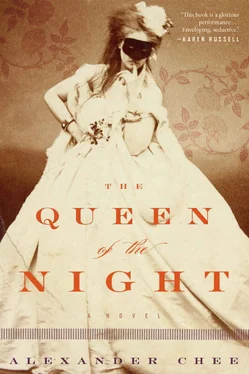§
The Théâtre du Thiergarten, as it was called in the handwritten program we were given later as we entered the salon that evening, announced it was proud to present Le Dernier Sorcier, an operetta by Ivan Turgenev and Pauline Viardot-García, as if it could do anything else. The room had been transformed since my earlier visit. The enormous green curtain confidently divided the salon, behind which oleander branches painted white peeped at the top. A fire was set in the fireplace, and the elegant chandelier lit, both somehow aloof to the curtain’s provocation. A beautiful piano sat directly under the chandelier at the room’s center and was lit by a lamp as well. The effect was a kind of suspenseful charm. If the forest beside Turgenev’s villa that led up into the mountains was magical, the entrance to that magic forest seemed to be here, behind the curtain.
The salon was the heart of the house, much greater in height than the other rooms, almost like a chapel, and faintly visible from here were the library and dining room. The audience was a small one, intimate — perhaps twenty or thirty people — and distinguished. The tenor was quickly busy in an animated conversation with the Prussian ambassador to the Baden-Baden court, and no sooner had I said hello, in a halting German, but I was introduced to Giulia Grisi, the famous retired soprano my fellow students had spoken of, who asked for us to be excused, drew me away, and sat me down beside her with a proprietary air. She told me she was visiting with Pauline, who’d told her all about me, and how excited she was to hear me after I’d finished my training. I love a Falcon voice, she said. Her interest in me bewildered me, and I tried to understand it as she went on about how she lived mostly in Florence but loved Germany and Pauline’s Baden-Baden set, and came often. She was a formidable woman, if not a tall one, with the appraising air of an assassin that vanished only when she smiled. Her dark hair sat in a severe crown of braids coiled on her head. Her black velvet gown, trimmed in black lace, nearly made her seem to be in mourning except I could not imagine her wearing anything else. She looked as if she might be an aunt to the Comtesse, and I was sure they knew each other — now she was admiring the tenor’s figure, telling me how handsome he must have been onstage at the Théâtre-Italien, and wasn’t I proud? I nodded and said I was.
Christmas is very charming in the Black Forest, she said, and patted my hand with hers. You must be sure to be here if you do not have plans. The way they celebrate it, one can imagine Christ being born again just to see for himself.
I said I would.
I’d not thought of a Christmas in some time. The idea was strange to me, as strange as choosing where to spend the holiday, all of it entirely alien. I’d spent exactly one Christmas in the Cajun Maidens — I recalled mulled wine that night in the food tent, and goose, as I recalled, and a tree lit with candles at the center of the wagons — and then it seemed as if I had not celebrated it since, except I must have. But the record of my time since then seemed not to reach all the way here, as if it had been cut somehow. My dress felt correct, though, and this reassured me: it was fancy enough to make me presentable without making me too much of an outsider, not so much with the other guests as with the other students, who had vanished, no doubt to prepare. I was anxious to adapt as quickly as I could to the prevailing culture of the household, though as I sat there, I was very aware I still wore my crinolines — a dress made for them would look woefully deflated without them, it seemed to me. I would need new clothes, and I made the note to myself even as Giulia, who’d been examining the tableau in front of us, returned her attention to me.
How fortunate you are to be about to begin your training with Pauline, she said.
I nodded.
How fortunate indeed. I think I might have sung longer if I’d had her as my teacher, she said. But who can say. What a life it is, she said. You will never know each day if the voice is any good until you begin your practice. Each morning could announce the end. But I shouldn’t frighten you, forgive me, she said.
What do you do when it leaves? I asked.
She held her hands up, palms facing up, and gestured to the scene around us with a smile. You see friends, she said. Be sure to have friends. And if you are lucky, you can give a farewell concert. But sometimes there is no chance, not if the voice goes quickly — for you want to be remembered at your best, always. Nothing less can do.
A wand tapped against the piano’s music stand, and then there were three knocks on the floor behind the curtain. The crowd went silent, and the curtain parted for Pauline, who smiled as we applauded. She then announced that the evening’s performance was to be dedicated to her guests of honor, and would we please stand and be welcomed. I waited for the tenor to stand first, and he was greeted with much affection and a few shouts, and then he gestured to me, and I stood also as my name was said, and Pauline announced I was her newest student. I waved as I had seen my hero, Adelina Patti, do, and then curtsied; and as I did so, I noted Giulia’s approval.
Pauline then sat down at the piano, and as she began to play, the curtain drew back, revealing the oleander trees to be in pots, enormous flowers made of paper, and the outlines of what looked like a little house, inside of which sat Krakamiche, the last of the sorcerers, who was received with much applause, for he was Turgenev, smiling to the audience before resuming the aggrieved face of a sorcerer on the wane. He opened his mouth to sing, and I heard a delicate soprano voice appear, to the laughter of the crowd, for it could not be his, high as his voice was — another was singing for him somewhere in the wings.
The tenor who sings for him could not be here, Giulia whispered to me.
Stella, the sorcerer’s beautiful daughter, was played by Maxine, who clearly relished the major role and was beautiful in her modest costume as the unmarried noble daughter supporting her father during the decline of his powers.
An opéra-bouffe-féerie, Le Dernier Sorcier told the story of an aging sorcerer living in a small hut in the woods with his daughter, Stella, who has enchanted a young Prince, Lelio. The Prince, having seen her while hunting in the woods and fallen in love with her, cannot find her to woo her and despairs, but luckily for him, he is overheard by the Queen of the Fairies, the ruler of the woods. She is plotting to make some mischief at the old wizard’s expense, seeing him as an interloper she has longed to be rid of. She knows of the beautiful Stella and offers the Prince a magical rose, which allows the bearer to be unseen, though only at night.
Giulia continued her asides to me, explaining who it was I saw as they appeared, the delicate girl in the costume of the Queen of the Fairies — a rose wreath in her hair, a diamond star flashing at its center — was Pauline’s daughter Claudie, and the girl acting as the head fairy, Verveine, was her other daughter Marianne. Krakamiche’s no-good, troublesome servant was played by Paul, Pauline’s son — he would sing an aria, to my delight. Prince Lelio was Natalya, who made a surprisingly handsome young prince. This left Firéne absent, but only she could be singing as the voice for Turgenev’s Krakamiche, it seemed to me.
The diminutive Queen, having helped the handsome young Prince in his pursuit of his love, plans some mischief. She sends a delegation of her most loyal fairies, disguised as Cochinese, claiming to bear a gift for the wizard — a magical grass that will restore the sorcerer’s youth and powers. When it instead causes him to dance a waltz that leaves him weak and humiliated, he vows revenge. The second act opens with him hunting through a book of Merlin’s spells for a spell that is a protection from all other magic, the most powerful spell of all. The beautiful Stella tries to get the sorcerer to be content with his decline, saying he has all he needs there in their modest house; but as he won’t hear it and instead keeps searching feverishly, she begins to sing to herself. After two verses, Prince Lelio, made invisible by the rose’s magic and hidden near her, sings the third verse in response, causing her to startle and then, when he drops the rose and is revealed to her, to smile. But this only convinces the sorcerer that his spell has succeeded and his powers are restored. He tries another, summoning a monster to rid his hut of this intruding prince, but instead a goat comes up from the earth and runs from the hut.
Читать дальше












